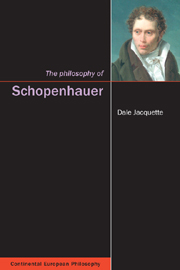Book contents
- Frontmatter
- Contents
- Dedication
- Preface
- Acknowledgements
- A note on texts and terminology
- Abbreviations
- Introduction: Schopenhauer's life and times
- 1 Schopenhauer's idealism
- 2 Empirical knowledge of the world as representation: from natural science to transcendental metaphysics
- 3 Willing and the world as Will
- 4 Suffering, salvation, death, and renunciation of the will to life
- 5 Art and aesthetics of the beautiful and sublime
- 6 Transcendental freedom of Will
- 7 Compassion as the philosophical foundation of morality
- 8 Schopenhauer's legacy in the philosophy of Nietzsche, Heidegger and the early Wittgenstein
- Notes
- Bibliography and recommended reading
- Index
4 - Suffering, salvation, death, and renunciation of the will to life
- Frontmatter
- Contents
- Dedication
- Preface
- Acknowledgements
- A note on texts and terminology
- Abbreviations
- Introduction: Schopenhauer's life and times
- 1 Schopenhauer's idealism
- 2 Empirical knowledge of the world as representation: from natural science to transcendental metaphysics
- 3 Willing and the world as Will
- 4 Suffering, salvation, death, and renunciation of the will to life
- 5 Art and aesthetics of the beautiful and sublime
- 6 Transcendental freedom of Will
- 7 Compassion as the philosophical foundation of morality
- 8 Schopenhauer's legacy in the philosophy of Nietzsche, Heidegger and the early Wittgenstein
- Notes
- Bibliography and recommended reading
- Index
Summary
By virtue of such necessity, man needs the animals for his support, the animals in their grades need one another, and also the plants, which again need soil, water, chemical elements and their combina- tions, the planet, the sun, rotation and motion round the sun, the obliquity of the ecliptic, and so on. At bottom, this springs from the fact that the will must live on itself, since nothing exists besides it, and it is a hungry will. Hence arise pursuit, hunting, anxiety, and suffering.
(WWR 1: 154)Insatiable Will
The Will, Schopenhauer maintains, is hungry. This is its manifest character, evidenced in all its objectifications. We see it all around us in the strife and suffering that pervade every aspect of life, and even in the non-living material world. There is nothing in existence besides Will as thing-in-itself and its objectifications in the world as representation. The hungry Will, as a result, can only feed on itself. The restless blind urging of Will, its pure wanting without wanting this or that, keeps the physical universe in motion without any purpose or plan. Will as thing-in-itself is the hidden inner force of gravity, electromagnetism, the principles of crystal growth, vegetation, nutrition, the reproductive urge, and all other natural phenomena. Will non-causally objectifies itself in these and countless other ways, but always as competition, discord and the opposition of predator and prey.
- Type
- Chapter
- Information
- The Philosophy of Schopenhauer , pp. 108 - 144Publisher: Acumen PublishingPrint publication year: 2005



